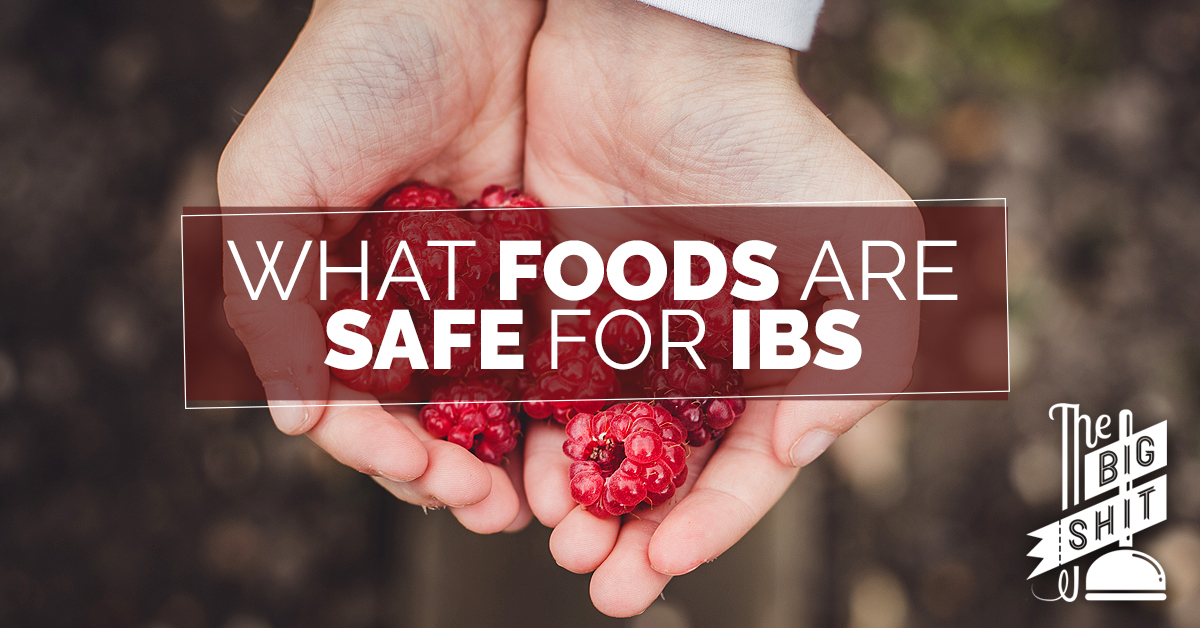
07 Aug What Foods Are Safe for IBS
Irritable bowel syndrome (IBS) is painful and uncomfortable. It can make a person’s intestines fluctuate between intolerable diarrhea and severe constipation, with a side of cramping, bloating, gas passing, or all of the above mentioned ailments. Finding foods that combat IBS can make for a more comfortable experience when it comes to becoming more regular.
Fruits
The fruit family has a lot to offer IBS sufferers (way more than just prunes), especially when it comes to fiber content.
Berries are a great source of fiber, especially blueberries and raspberries. Both of these fruits are delicious and easy to munch on as a snack or complimentary side to any meal. According to experts at the nationally recognized Mayo Clinic in Minnesota, “Women should try to eat at least 21 to 25 grams of fiber a day, while men should aim for 30 to 38 grams a day.” The Mayo Clinic staff reported that a single serving of raspberries (usually considered to be one full measuring cup) has a powerful punch of 8 grams of fiber.
A person struggling with IBS could also easily grab a fruit with a peel to get some much needed soluble fiber. Fiber can be broken into two categories known as soluble and insoluble. WebMD explained it best by stating, “Most foods contain both insoluble and soluble fiber but are usually richer in one type than the other. The easiest way to tell them apart: Soluble fiber absorbs water, turning into a gel-like mush (think of what happens when you add water to oatmeal) while insoluble fiber doesn’t (think of what happens when you add water to celery).” Soluble fiber do a better job at combating impacted bowels.
Apples and pears have a lot of soluble fiber, but be sure to eat them whole and with the outer skin. Peeling an apple or pear make these two tree fruits lose a lot of powerful fiber punch. The staff at the Mayo Clinic reported that a medium sized apple has 4.4 grams of fiber, while a medium sized pear has 5.5 grams of fiber. The majority of the helpful fiber content can be found in the skin of these two fruits. If an apple or pear do not help ease IBS discomfort, move on to a banana or orange which also have good amounts of fiber.
Vegetables
Of course veggies are another food group that cannot be overlooked when a person is suffering from IBS. Eating the right vegetables in the right serving amounts can do a lot for an individual’s digestive tract. Some veggies are known to increase the chance of farting in public.
“Some vegetables such as cabbage, broccoli, onions, cauliflower and peas, can cause flatulence, while other more easily digested vegetables do not,” explained SFGate. “Zucchini is easy to digest and leaves few residues that can be excessively fermented in your gastrointestinal tract, which can help you prevent gas.”
Other vegetables, in addition to zucchini, that should be incorporated into an IBS sufferer’s diet may include: carrots, sweet potatoes, beets, and parsnips.
Grains
Many struggling with IBS think that the grain group must be eliminated from his or her food plan in order to feel better. This is not necessarily the case. SFGate offered specific insight on fiber rich grains that should help in the plight against bowel problems, “Most grains have some soluble fiber content, but the champions are oats and barley.” Therefore, it is okay for those diagnosed with IBS to reach for a bowl of oatmeal or an oat bran muffin at breakfast time. A barley soup or nice barley risotto at dinner could also help with stomach pains from IBS.
Food Labels
It is important to remember that all of the above mentioned foods are high in fiber, which can be a good thing when it comes to maintaining regular bowel movements. However, runny diarrhea or severe bloating could occur if too much fiber is ingested. That is why it is always important to pay attention to nutrition labels and serving sizes. Do not eat only one fiber source, but try a variety to make a plan that works to offset IBS symptoms. Keep a diary log to figure out the fiber rich foods that help versus the ones that trigger an unfortunate bowel episode.
IBS is a pain in many ways for many people, but there are foods out there that will help end long-term discomfort. According to the International Foundation for Functional Gastrointestinal Disorders, “IBS affects between 25 and 45 million people in the United States. About 2 in 3 IBS sufferers are female. About 1 in 3 IBS sufferers are male. IBS affects people of all ages, even children.” Therefore, it is imperative to take care and eat healthy foods that are rich in fiber in order to promote better digestive health and find a solution to chronic IBS.
